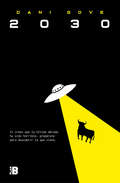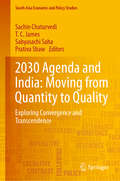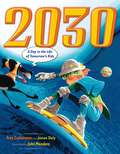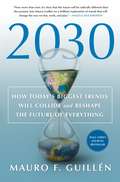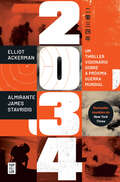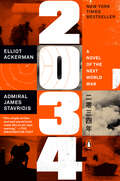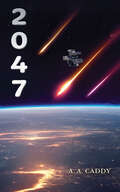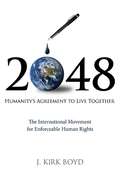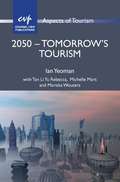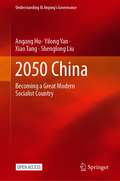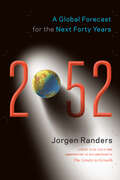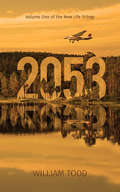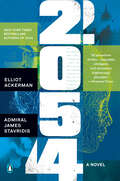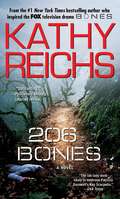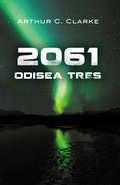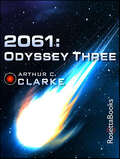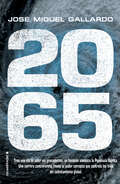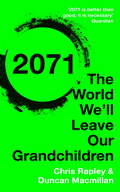- Table View
- List View
2030
by Dani Gove2030 es un cóctel apocalíptico que repasa, desde el humor y la sátira, nuestra evolución como especie en un futuro próximo. En 2030... ¿Podremos clonarnos para echar las horas extras del curro? ¿Mantendremos relaciones sexuales con robots aspiradores? ¿Lograremos detener el avance del cambio climático? ¿Habrán dejado por fin de hacer pelis de superhéroes? ¿Dónde están esos malditos coches voladores?
2030 - Strategieentwicklung für Innovation Leaders: Mit Handlungsanweisungen unter Einbezug neuester Methoden der Datennutzung
by Tobias Hertfelder Philipp FutterknechtSeit der Relativitätstheorie wissen wir, dass massereiche Objekte durch ihre Gravitation Dinge anziehen. Je größer die Masse desto größer ist auch die Anziehungskraft. Genauso verhält es sich auch in Strategieprojekten. Jeder Projektteilnehmer ist dabei ein massereicher Teilnehmer und hat Auswirkungen auf das Zusammenspiel. Was sich gravierend geändert hat ist der Einfluss der Daten auf diesen Prozess. Wer dies nicht berücksichtigt, wird in Zukunft enorme Einbußen hinnehmen müssen. Da sich durch diese Veränderung ein neues Gleichgewicht einstellt, ändern sich auch die Erfolgsaussichten der angewandten Methoden und Verhaltensweisen. Wie Sie diesen Wandel meistern können und was Sie dazu benötigen erfahren Sie in diesem Buch.
2030 Agenda and India: Exploring Convergence and Transcendence (South Asia Economic and Policy Studies)
by Sachin Chaturvedi Sabyasachi Saha T. C. James Prativa ShawThis book presents a selection of multifaceted development issues involving social, economic and environmental aspects, in order to inspire and guide implementation of the United Nations’ SDGs. It focuses on economic development, human well-being and sustainable pathways, with special attention to financial and knowledge resources, as well as measurement concepts. In doing so, the book draws a distinction between sustainability and sustainable pathways by refraining from dealing with broader and more direct environmental sustainability issues like climate change, environmental degradation and sustainable energy. The choice of topics, apart from their relevance for India, was guided by their importance in connection with multiple SDG goals. In addition to revealing the intricacies of systemic relationships and the dilemmas they create in policy choices, the book examines the role of actors and the critical importance of partnerships to help readers comprehend the breadth of diversities and inter-linkages involved. The roles of the central and state governments, the parliament and the state assemblies, the civil society, UN agencies and district-level authorities are separately explored in depth. Sharing valuable insights, the book encourages policymakers, practitioners and scholars to move towards a sustainable and equitable economy, and supports them in their efforts.
2030: A Day in the Life of Tomorrow's Kids
by James Daly Amy ZuckermanWinner of the 2012 Grand Canyon Reader Award for a Non-fiction bookGlobal events and new technology change how we live from moment to moment. So, what will our world be like in twenty years? Come take a look as futurists Amy Zuckerman and James Daly examine what a kid?s daily life might be like in the year 2030. Inspired and informed by trends and scientifi c and technological research, 2030 is not only a peek at some cool future gadgets (talking dog collars, cars that drive themselves), but also a thoughtful examination of how our lives might be impacted as we adjust to environmental change.
2030: How Today's Biggest Trends Will Collide and Reshape the Future of Everything
by Mauro F. GuillénAN INTERNATIONAL BESTSELLERWall Street Journal BestsellerA Porchlight Book BestsellerFinancial Times Best Books of 2020Yahoo Finance Favorite Business Books of 2020 JP Morgan NextList 2021 selection"Bold, provocative...illuminates why we’re having fewer babies, the middle class is stagnating, unemployment is shifting, and new powers are rising.” —ADAM GRANTThe world is changing drastically before our eyes—will you be prepared for what comes next? A groundbreaking analysis from one of the world's foremost experts on global trends, including analysis on how COVID-19 will amplify and accelerate each of these changes. Once upon a time, the world was neatly divided into prosperous and backward economies. Babies were plentiful, workers outnumbered retirees, and people aspiring towards the middle class yearned to own homes and cars. Companies didn't need to see any further than Europe and the United States to do well. Printed money was legal tender for all debts, public and private. We grew up learning how to "play the game," and we expected the rules to remain the same as we took our first job, started a family, saw our children grow up, and went into retirement with our finances secure.That world—and those rules—are over.By 2030, a new reality will take hold, and before you know it:- There will be more grandparents than grandchildren- The middle-class in Asia and Sub-Saharan Africa will outnumber the US and Europe combined- The global economy will be driven by the non-Western consumer for the first time in modern history- There will be more global wealth owned by women than men- There will be more robots than workers- There will be more computers than human brains- There will be more currencies than countriesAll these trends, currently underway, will converge in the year 2030 and change everything you know about culture, the economy, and the world.According to Mauro F. Guillen, the only way to truly understand the global transformations underway—and their impacts—is to think laterally. That is, using “peripheral vision,” or approaching problems creatively and from unorthodox points of view. Rather than focusing on a single trend—climate-change or the rise of illiberal regimes, for example—Guillen encourages us to consider the dynamic inter-play between a range of forces that will converge on a single tipping point—2030—that will be, for better or worse, the point of no return.2030 is both a remarkable guide to the coming changes and an exercise in the power of “lateral thinking,” thereby revolutionizing the way you think about cataclysmic change and its consequences.
2034
by James Stavridis Elliot AckermanNum mundo pós-apocalítico tenso e aterrorizante que explora a essência do medo, uma mulher, com duas crianças, decide fugir, sonhando com uma vida em segurança. Mas durante a viagem o perigo está à espreita: basta uma decisão errada e eles morrerão. Cinco anos depois de a epidemia ter começado, os sobreviventes ainda se escondem em abrigos, protegidos atrás de portas trancadas e janelas tapadas. Malorie e os seus filhos conseguiram sobreviver, mas agora que eles têm 4 anos chegou o momento de abandonar o refúgio. Procurar uma vida melhor, em segurança e sem medos. Num barco a remos e de olhos vendados, os três embarcam numa viagem rio acima. Apenas podem confiar no instinto e na audição apurada das crianças para se guiarem. De repente, sentem que estão a ser seguidos. Nas margens abandonadas, alguém observa. Será animal, humano ou monstro?
2034: A Novel of the Next World War
by Elliot Ackerman Admiral James StavridisFrom two former military officers and award-winning authors, a chillingly authentic geopolitical thriller that imagines a naval clash between the US and China in the South China Sea in 2034--and the path from there to a nightmarish global conflagration. <P><P>On March 12, 2034, US Navy Commodore Sarah Hunt is on the bridge of her flagship, the guided missile destroyer USS John Paul Jones, conducting a routine freedom of navigation patrol in the South China Sea when her ship detects an unflagged trawler in clear distress, smoke billowing from its bridge. On that same day, US Marine aviator Major Chris "Wedge" Mitchell is flying an F35E Lightning over the Strait of Hormuz, testing a new stealth technology as he flirts with Iranian airspace. By the end of that day, Wedge will be an Iranian prisoner, and Sarah Hunt's destroyer will lie at the bottom of the sea, sunk by the Chinese Navy. Iran and China have clearly coordinated their moves, which involve the use of powerful new forms of cyber weaponry that render US ships and planes defenseless. In a single day, America's faith in its military's strategic pre-eminence is in tatters. A new, terrifying era is at hand. <P><P>So begins a disturbingly plausible work of speculative fiction, co-authored by an award-winning novelist and decorated Marine veteran and the former commander of NATO, a legendary admiral who has spent much of his career strategically outmaneuvering America's most tenacious adversaries. Written with a powerful blend of geopolitical sophistication and human empathy, 2034 takes us inside the minds of a global cast of characters--Americans, Chinese, Iranians, Russians, Indians--as a series of arrogant miscalculations on all sides leads the world into an intensifying international storm. In the end, China and the United States will have paid a staggering cost, one that forever alters the global balance of power. Everything in 2034 is an imaginative extrapolation from present-day facts on the ground combined with the authors' years working at the highest and most classified levels of national security. Sometimes it takes a brilliant work of fiction to illuminate the most dire of warnings: 2034 is all too close at hand, and this cautionary tale presents the reader a dark yet possible future that we must do all we can to avoid. <P><P><b>A New York Times Bestseller</b>
204 Rosewood Lane
by Debbie MacomberOlivia LockhartCedar Cove, WashingtonDear Reader,If you've been to Cedar Cove before, you've probably met my friend Grace Sherman. You can usually find her at home-she lives at 204 Rosewood Lane-or at the public library, where she works. Like me, she grew up in this town and she's raised two daughters here. But did you hear that about six months ago, her husband disappeared? Just...disappeared. Where's Dan? Why did he go? Who's he with? Will Grace ever find out?I hope that all of us, her family and friends, are bringing her comfort during this difficult time. Comfort and a sense of shelter. I'm continually reminded that life can and does go on. For instance, everyone's been discussing weddings and babies lately. Justine, my daughter, rather impulsively got married a little while ago. Grace's daughter Kelly recently had a baby. Unfortunately, she refuses to accept that Dan might not return to see his first grandchild. Grace's older daughter, Maryellen, is more realistic. Grace thinks she's seeing a new man but for some reason won't say who it is.Then there's Jack Griffin, our local newspaper editor, the man I've been seeing. And...well, I have lots to tell you. Come on over and we'll talk!Olivia
204 Rosewood Lane (Cedar Cove #2)
by Debbie MacomberLove always finds a way in this heartwarming second installment in the Cedar Cove series, only from #1 New York Times bestselling author Debbie MacomberJudge Olivia Lockhart’s plate is full. Her hometown of Cedar Cove is the kind of community that’s always relied on each other for support, but lately it seems everybody needs somebody to lean on, especially Olivia’s best friend, Grace Sherman, whose husband disappeared six months prior. Thirty-five years together, then—just gone. Moving forward without closure is hardly ideal, but for librarian Grace, it may be time to start a new chapter.For Olivia, helping her good friend start over is just the beginning. There are enough marriages, separations, and babies being born in Cedar Cover to keep anyone on their toes. And when Olivia’s ex-husband makes it clear he wants her back, it throws a serious wrench at her on-again, off-again relationship with newspaper editor Jack Griffin. Sometimes the right path isn’t always clear, but finding the courage to follow your heart will lead you right where you belong.Previously published
2043
by Edward M WolfeUn nuovo governo nasce in America sulle ceneri di un devastante dopoguerra civile, fatto di attacchi biologici e nucleari. Con la popolazione fortemente ridotta, ma la tecnologia e le infrastrutture ancora intatte, l'amministratore rimodella la struttura economica e sociale della nuova America che nasce dalle ceneri della vecchia. Concetti obsoleti e pieni di errori come libertà e privacy vengono sostituiti con ideali progressisti di uguaglianza e sicurezza. Coppie di ufficiali dell'Equality Enforcement Corps pattugliano le strade e i droni della EEC volano non troppo in alto sopra di loro. I criminali violenti sono considerati irredimibili e vengono esiliati. Entro l'anno 2043, il prossimo obiettivo è identificare i giovani cittadini attualmente rispettosi della legge che hanno il potenziale per diventare i criminali e i sociopatici di domani. Il Dr. Fielding del dipartimento per le pari opportunità ritiene che se possono essere identificati, possono essere riparati. Inizia con quattro adolescenti...
2043 A.D.
by Edward M WolfeUn nuevo gobierno surge en una América de posguerra asolada por la guerra civil y los ataques biológicos y nucleares. Con la población muy reducida, pero la tecnología y la infraestructura aún intactas, el Administrador reestructura la estructura económica y social de la nueva América que surge de las cenizas de la antigua. Conceptos anticuados y cargados de fallos como la libertad y la privacidad son sustituidos por los ideales progresistas de igualdad y seguridad. Parejas de agentes del Equality Enforcement Corps patrullan las calles, y los drones del EEC vuelan no muy alto sobre ellas. Los delincuentes violentos son considerados irredentos y son exiliados. Para el año 2043, el siguiente objetivo es identificar a los jóvenes ciudadanos que actualmente respetan la ley y que tienen el potencial de convertirse en los criminales y sociópatas del mañana. El Dr. Fielding, del Departamento de Igualdad de Oportunidades, cree que si se les puede identificar, se les puede curar. Comienza con cuatro adolescentes...
2043 A.D.
by Edward M WolfeUn nouveau gouvernement surgit dans une Amérique de l'après-guerre ravagée par la Guerre Civile, biologiques et nucléaires. Avec une population fortement en déclin, mais une technologie et des infrastructures intactes, l'Administrateur remodèle la structure économique et sociale de la nouvelle Amérique qui renaît des cendres de l'ancienne. Des concepts obsolètes et erronés comme la liberté et la vie privée sont remplacés par les idéaux progressistes d'égalité et de sécurité. Des officiers de l'Equality Enforcement Corps patrouillent dans les rues, et les drones de l'EEC volent pas trop haut au-dessus d'eux. Les criminels violents sont réputés irrécupérables et sont exilés. D'ici 2043, le prochain objectif est d'identifier les jeunes citoyens actuellement respectueux des lois qui ont le potentiel de devenir les criminels et les sociopathes de demain. Le Docteur Fielding du Departement of Equality Opportunity estime que s'ils peuvent être identifiés, ils peuvent être corrigés. Il commence avec quatre adolescents...
2043 n. Chr.: Die Rückkehr von Big Brother
by Edward M WolfeEine neue Regierung entsteht in einem Nachkriegsamerika, das von Bürgerkrieg, biologischen und nuklearen Angriffen heimgesucht wird. Da die Bevölkerung stark reduziert ist, aber Technologie und Infrastruktur noch intakt sind, gestaltet der Administrator die wirtschaftliche und soziale Struktur des neuen Amerikas, das aus der Asche des alten entsteht, neu. Veraltete und fehlerbehaftete Konzepte wie Freiheit und Privatsphäre werden durch die fortschrittlichen Ideale von Gleichheit und Sicherheit ersetzt. Paare von Beamten des Equality Enforcement Corps patrouillieren auf den Straßen, und EEC-Drohnen fliegen nicht zu hoch über ihnen. Gewaltverbrecher gelten als uneinlösbar und werden ins Exil geschickt. Bis zum Jahr 2043 besteht das nächste Ziel darin, derzeit gesetzestreue junge Bürger zu identifizieren, die das Potenzial haben, die Kriminellen und Soziopathen von morgen zu werden. Dr. Fielding von der Abteilung für Chancengleichheit glaubt, dass, wenn sie identifiziert werden können, sie repariert werden können. Er beginnt mit vier Teenagern...
2047
by A. A. CaddyNatasha, raised in an orphanage in Hiroshima, has always been searching for the truth about her past. But when she becomes one of two female commanders on a space lab tracking two massive asteroids, she finds herself in the middle of a mystery that threatens to end life as we know it. With the Earth on the brink of destruction, everyday objects are appearing in the strangest places – over 250,000 years old, and seemingly out of time. From digital watches in museums to modern spectacles in ancient Egyptian digs, something is not right. And as the asteroids change direction, heading straight for the planet, a third, massive, metallic sphere appears. Will Natasha and the team be able to stop the impending extinction event, or will the Earth be lost forever?
2048: Humanity's Agreement To Live Together: The International Movement for Enforceable Human Rights
by J. Kirk BoydCreating an enforceable international guarantee of basic human rightsOutlines the basics of a universally acceptable agreementShows what everyone can do to make this agreement a realityIn 1948 the United Nations General Assembly adopted the Universal Declaration of Human Rights, a deeply inspiring document that has been translated into over 300 languages and dialects. But because its provisions are not enforceable, its promise has not been fulfilled. Human rights violations continue in every corner of the globe, the cause of countless individual tragedies as well as large-scale disasters like war, poverty and environmental ruin.It’s time to take the next step. 2048 sets out a visionary, audacious, but, Kirk Boyd insists, achievable goal: drafting an enforceable international agreement that will allow the people of the world to create a social order based upon human rights and the rule of law. Boyd and the 2048 Project aim to have this agreement, the International Convention on Human Rights, in place by the 100th anniversary of the Universal Declaration.Written documents have always played a key role in advancing human rights: the Code of Hammurabi, the Magna Carta, the Declaration of Independence. The express purpose of the International Convention is to safeguard what Boyd calls the Five Freedoms, adding freedom for the environment to Franklin Roosevelt’s famous Four Freedoms: freedom of speech, freedom of religion, freedom from want, and freedom from fear.Boyd skillfully anticipates objections to the notion of a universal and enforceable written agreement—that it would be culturally insensitive, too expensive, unacceptably limit national sovereignty—and convincingly answers them. In fact some promising first steps have already been taken. He describes existing transnational agreements with effective compliance mechanisms that can serve as models.But Boyd wants to inspire more than argue. In 2048 he urges everyone to participate in the drafting of the agreement via the 2048 website and describes specific actions people can take to help make it a reality. “What you do with what you read” Boyd writes, “is as important as what this book says.” Little by little, working together creatively with the tools now available, we can take the next step forward in the evolution of human rights.
2050 Tomorrow's Tourism
by Ian YeomanIn 2050, it is predicted that 4.7bn or nearly 50% of the world's population will take an international holiday. But can humankind meet that forecast given the issues of ageing populations, peak oil, the global financial crisis and climate change? This book constructs scenarios from Shanghai to Edinburgh, Seoul to California encompassing complex topics such as human trafficking, conferences, transport, food tourism or technological innovation. This is a blue skies thinking book about the future of tourism and a thought-provoking analytical commentary.
2050 China: Becoming a Great Modern Socialist Country (Understanding Xi Jinping’s Governance)
by Angang Hu Yilong Yan Xiao Tang Shenglong LiuThis book is open access under a CC BY-NC-ND 4.0 license.This book is arranged and developed around the theme of “2050 China,” it analyzes the factors and advantages of the Chinese road to socialist modernization, explores and summarizes the development goal and the basic logic of the socialist modernization of China, and further shows the general basis of the primary stage of socialism. According to the report delivered at the 19th Party Congress, and according to the “two-stage” strategic plan, this book looks ahead in detail to the overarching objective and sub-objectives of essentially achieving socialist modernization by 2035, discusses the building of a great modern socialist country in all respects from the perspective of the Party’s six-sphere integrated plan of economic, political, cultural, social, ecological civilization, and national defense construction, and provides policy proposals. This book also analyzes the influence and the effect of the socialist modernization with Chinese characteristics on the world and it further presents the third centenary goal. In conclusion, this book is an elaboration of the work of the Institute for Contemporary China Studies, Tsinghua University. It reflects the intellectual innovation in the authors’ research on contemporary China, as well as the authors’ foresight and predictions about China’s future development.
2052: A Global Forecast for the Next Forty Years
by Jorgen RandersWith clarity, conscience, and courage, global-systems pioneer Jorgen Randers and his distinguished contributors map the forces that will shape the next four decades.Forty years ago, The Limits to Growth study addressed the grand question of how humans would adapt to the physical limitations of planet Earth. It predicted that during the first half of the 21st century the ongoing growth in the human ecological footprint would stop-either through catastrophic "overshoot and collapse"-or through well-managed "peak and decline."So, where are we now? And what does our future look like? In the book 2052, Jorgen Randers, one of the coauthors of Limits to Growth, issues a progress report and makes a forecast for the next forty years. To do this, he asked dozens of experts to weigh in with their best predictions on how our economies, energy supplies, natural resources, climate, food, fisheries, militaries, political divisions, cities, psyches, and more will take shape in the coming decades. He then synthesized those scenarios into a global forecast of life as we will most likely know it in the years ahead.The good news: we will see impressive advances in resource efficiency, and an increasing focus on human well-being rather than on per capita income growth. But this change might not come as we expect. Future growth in population and GDP, for instance, will be constrained in surprising ways-by rapid fertility decline as result of increased urbanization, productivity decline as a result of social unrest, and continuing poverty among the poorest 2 billion world citizens. Runaway global warming, too, is likely.So, how do we prepare for the years ahead? With heart, fact, and wisdom, Randers guides us along a realistic path into the future and discusses what readers can do to ensure a better life for themselves and their children during the increasing turmoil of the next forty years.
2053: Volume One of the New Life Trilogy
by William ToddThe novel 2053 is the first volume of the New Life trilogy. This book sets the scene for science fiction sequels. 2053 is a story of human frailty, endeavour and ambition with episodes of murder, sexual indiscretion and exploitation taking place in a futuristic world. The novel is quick paced with apparently unrelated events leading to the search for a mysterious girl. Parallel to the search, the story follows the preparedness of the spacecraft New Life.
2054: A Novel
by Elliot Ackerman Admiral James StavridisFrom the acclaimed authors of the runaway New York Times bestseller 2034 comes another explosive work of speculative fiction set twenty years further in the future, at a moment when a radical leap forward in artificial intelligence combines with America&’s violent partisan divide to create an existential threat to the country, and the worldIt is twenty years after the catastrophic war between the United States and China that brought down the old American political order. A new party has emerged in the US, one that&’s held power for over a decade. Efforts to cement its grip have resulted in mounting violent resistance. The American president has control of the media, but he is beginning to lose control of the streets. Many fear he&’ll stop at nothing to remain in the White House. Suddenly, he collapses in the middle of an address to the nation. After an initial flurry of misinformation, the administration reluctantly announces his death. A cover-up ensues, conspiracy theories abound, and the country descends into a new type of civil war.A handful of elite actors from the worlds of computer science, intelligence, and business have a fairly good idea what happened. All signs point to a profound breakthrough in AI, of which the remote assassination of an American president is hardly the most game-changing ramification. The trail leads to an outpost in the Amazon rainforest, the last known whereabouts of the tech visionary who predicted this breakthrough. As some of the world&’s great powers, old and new, state and nonstate alike, struggle to outmaneuver one another in this new Great Game of scientific discovery, the outcome becomes entangled with the fate of American democracy.Combining a deep understanding of AI, biotech, and the possibility of a coming Singularity, along with their signature geopolitical sophistication, Elliot Ackerman and Admiral James Stavridis have once again written a visionary work. 2054 is a novel that reads like a thriller even as it demands that we consider the trajectory of our society and its potentially calamitous destination.
206 Bones: A Novel (Temperance Brennan #12)
by Kathy ReichsThe #1 New York Times bestselling author and producer of the Fox television hit, Bones, returns with a spectacular new Tempe Brennan novel. <P> There are 206 bones in the human body. Forensic anthropologists know them intimately, can read in them stories of brief or long lives and use them to reconstruct every kind of violent end. 206 Bones opens with Tempe regaining consciousness and discovering that she is in some kind of very small, very dark, very cold enclosed space. She is bound, hands to feet. Who wants Tempe dead, or at least out of the way, and why? Tempe begins slowly to reconstruct... Tempe and Lieutenant Ryan had accompanied the recently discovered remains of a missing heiress from Montreal to the Chicago morgue. Suddenly, Tempe was accused of mishandling the autopsy -- and the case. Someone made an incriminating phone call. Within hours, the one man with information about the call was dead. Back in Montreal, the corpse of a second elderly woman was found in the woods, and then a third. Seamlessly weaving between Tempe's present-tense terror as she's held captive and her memory of the cases of these murdered women, Reichs conveys the incredible devastation that would occur if a forensic colleague sabotaged work in the lab. The chemistry between Tempe and Ryan intensifies as this complex, riveting tale unfolds.
2061: Odisea tres
by Arthur C. Clarke"Era el verano en que el precio de una barra de pan alcanzó el millón de rublos ..." Esta frase nos introduce en la convulsa Rusia de 1999. Esta gran superpotencia zozobra en un mar de hiperinflación, caos económico y criminalidad. Las elecciones se aproximan y una sola voz carismática resuena en todo el país. Igor Komárov, líder derechista, promete reformar la moneda, acabar con el crimen, eliminar la corrupción y devolver la gloria a Rusia. Pero los dirigentes occidentales se ven conmocionados cuando llega a sus manos un documento secreto del que se desprende que, Komárov, no es el salvador de la nación sino un nuevo Hitler. Oficialmente, Occidente no puede hacer nada, pero un grupo de prohombres angloamericanos decide no quedarse impasibles viendo cómo la historia se repite. El Manifiesto Negro es Forsyth en toda su plenitud: intrincado realismo político, intriga a raudales y una trama que corta el aliento.
2061: Odyssey Three (Space Odyssey Series #3)
by Arthur C. ClarkeThis New York Times–bestselling chapter in the Hugo Award–winning Space Odyssey series is &“intriguing and satisfying . . . the all-round best Odyssey so far&” (Kirkus Reviews). The third book in Clarke&’s beloved Space Odyssey continues the story of Heywood Floyd, survivor of two previous encounters with the mysterious monoliths and the alien intelligences behind them. Floyd is chosen as one of a handful of celebrity guests to witness the first manned touchdown on the surface of Halley&’s Comet on the privately-owned spaceship Universe. But on Jupiter&’s moon Europa, scientists have spotted the sudden appearance of a single diamond the size of a mountain—a fragment of Jupiter&’s core. When the spaceship Galaxy is hijacked and forced to crash into Europa&’s ocean, the Universe is diverted from its original mission to rescue the crew. Now Heywood Floyd must once again survive an encounter with HAL, David Bowman, and the mysterious monolith-building race with its own inscrutable agenda to shape the destiny of the human race.
2065
by José Miguel GallardoMadrid, 2065. El calentamiento global provoca temperaturas altísimas con víctimas por golpes de calor, así como escasez de agua y de fuentes de energía. Un asesor del Ministerio del Cambio Climático, Adrián Salor, recibe la noticia del accidente mortal de su mujer, África, que ha quedado carbonizada en un lugar distinto a donde debía estar. En el funeral, un extraño con una cicatriz se acerca a Adrián, que se sabe vigilado sin identificar a sus perseguidores ni sus motivos. Decide ir al templo de Debod para desenterrar una cápsula del tiempo en la que África y él guardaron sendas cartas de amor, pero en lugar de las cartas encuentra una foto que su mujer le ocultó durante demasiado tiempo, y en la que aparece el mismo hombre de la cicatriz. A partir de aquí, una serie de sucesos empujan a Adrián a investigar los entresijos de un poder corrupto que controla el planeta a nivel global.
2071: The World We'll Leave Our Grandchildren
by Duncan Macmillan Chris RapleyHow has the climate changed in the past? How is it changing now? How do we know?And what kind of a future do we want to create?
